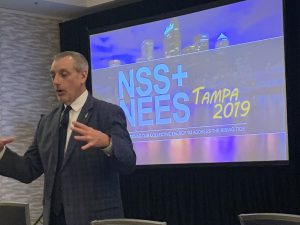April 22 is Earth Day. A lot has changed since 1970, when leaders and students on college campuses across the US organized the first Earth Day as a “teach-in” on the environment. Forty-nine years ago, there was very little public awareness about the scale, causes and consequences of air and water pollution; the challenge at that time was simply to make people aware of the problem–to “give a hoot, don’t pollute.” Today, thanks to education efforts by Extension, government and private organizations and the media, public awareness about environmental issues is much greater and more complex. It’s not enough to talk about greedy polluters vs. “the environment” anymore; the public wants to know how businesses can thrive, communities can grow, and everyday life can improve while sustaining the quality and quantity of our natural resources. It’s a complex challenge that has to be approached by experts from many different fields listening to many different voices to confront many different issues.
An example of how diverse people are coming together to address complex issues of sustainability took place in Tampa April 16-19, where UF/IFAS hosted the National Sustainability Summit and National Extension Energy Summit. This was the first time Florida has been the host of the biennial joint summits, which bring together experts and stakeholders from government, industry, and education to discuss issues related to energy, climate, water, food, land and community resiliency.
Why Florida? Because we’re on the front line of the 21st century’s sustainability and energy crises. The state’s population of 21 million is projected to grow to 30 million by 2050, putting an increased strain on water and energy consumption and food security. Engineers estimate that we can draw a total of 850 millions of gallons per day without damaging our surface and groundwater system, but by 2035 demand for water is projected to shoot far beyond that to 1.1 billion gallons per day. Climate change? Streets and waterways in South Florida and other areas are already experiencing unprecedented flooding, and communities across the state are dealing with salt-water intrusion, the spread of pests and diseases, declines in crop production and other issues, all related to climate change. Stormwater runoff from urban landscapes, septic systems, increasing populations and agricultural nutrients gives rise to harmful algal blooms that kill marine life and drive away tourism. So yes, Florida’s a good place for a sustainability summit.

What are we doing about it? UF/IFAS Extension is in unique position address these vexing issues. We’re in each of Florida’s 67 counties, so we know what sustainability means on a community level. As the outreach tool of a land-grant university, we have direct access to the latest scientific research. We’ve formed partnerships with businesses, government, HOAs and environmental organizations, so we have the ear of the change-makers as well as the stakeholders. We have the depth and breadth of expertise to approach problems from many angles.
These multifaceted approaches to sustainability issues were presented in sessions by our own Extension faculty at the summits.
- Susan Haddock reported the results of the Florida-Friendly LandscapingTM Program, which in 2017 reached over 60,000 homeowners who saved a total of 176 million gallons of water.
- Laurie Albrecht explained how Palm Beach County’s “Let Every Drop Count” program was using community-based social marketing to foster large-scale behavior changes in landscape irrigation.
- Lee Hayes Byron outlined programs that promoted electric vehicle use and employee engagement strategies for sustainability in Sarasota County.
- Benjamin Crist and Wendy-Lin Bartels talked about working with farmers to grow carinata as a renewable energy source.
- Carrie Stevenson presented a series of short films about a collaborative, multi-state project to help communities plan for flooding along the Gulf of Mexico.
- Florida Sea Grant Agent Erik Lovestrand described a program that helps homeowners reduce energy use while limiting outdoor lighting that can lead to the stranding of nesting sea turtles.
These are just a few of the many innovative and successful programs presented at the summits by UF/IFAS Extension faculty, together with educators and researchers throughout Florida and the US. And these, in turn, are just a small sample of UF/IFAS Extension’s efforts, on Earth Day and every other day, to put Florida on the path to being more sustainable, one community at a time.
Many of these are small, ground-level initiatives that effect incremental changes. You might ask, a few thousand gallons here, a few megawatt hours saved there—what’s the difference? There’s so much more to be done to help communities find workable solutions and influence policy makers in Tallahassee and Washington D.C. that it can seem like an insurmountable task.
On the other hand, once you stop believing something is impossible, it becomes possible. By projecting a better future, we influence how people see the present and help them get on board with the future we envision.
It isn’t—and it never will be—easy, especially when we are dealing with vexing issues and problems that won’t be solved today, and maybe not tomorrow either. The future may be uncertain, but what is certain is that if we do not apply change today, a basic course is already in motion, one we can’t afford to let happen.
 0
0
